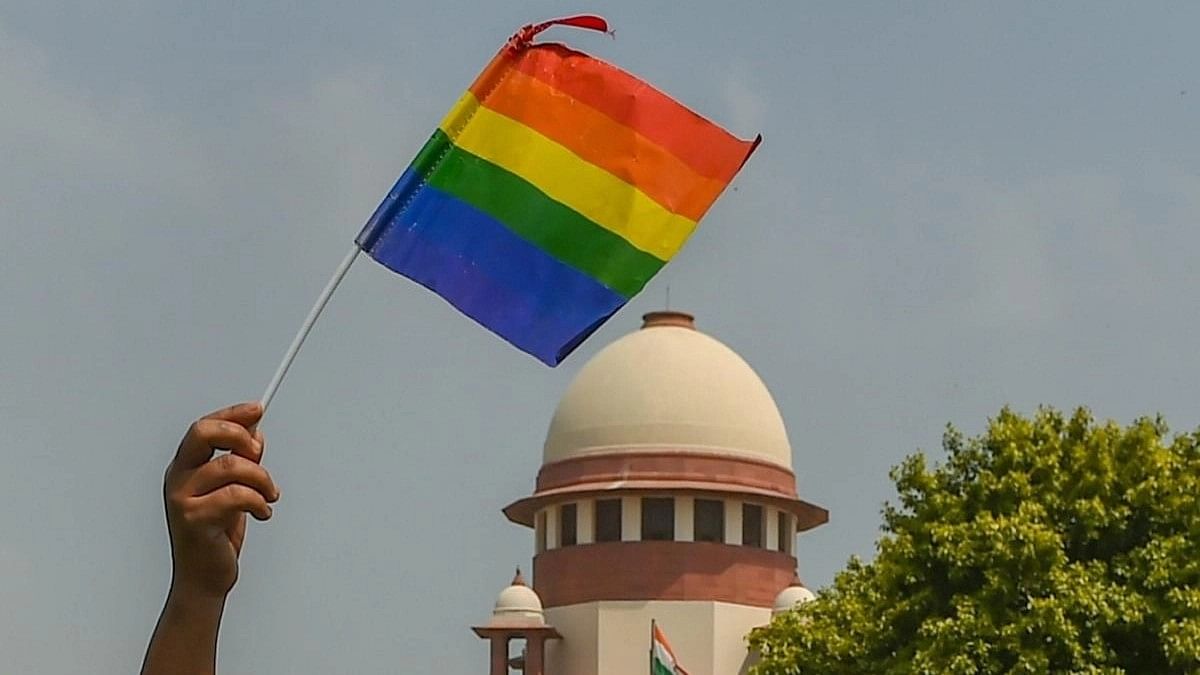
An activist waves a rainbow flag (LGBT pride flag) in front of the Supreme Court.
Credit: PTI Photo
New Delhi: The Supreme Court on Tuesday said same-sex couples continued to face discrimination and harassment in their daily lives, and asked the government to act on its proposal to form a high-powered committee to expeditiously look into genuine concerns faced by same-sex partners.
A five-judge constitution bench led by Chief Justice of India D Y Chandrachud and comprising Justices S K Kaul, S Ravindra Bhat, Hima Kohli, and P S Narasimha recorded the assurance of the Solicitor General Tushar Mehta that the government will constitute a committee chaired by the Cabinet Secretary for the purpose of defining and elucidating the scope of the entitlements of queer couples who are in unions.
The CJI said the committee should include experts with domain knowledge and experience in dealing with the social, psychological, and emotional needs of persons belonging to the queer community as well as members of the queer community.
He said the report of the committee chaired by the Cabinet Secretary shall be implemented at the administrative level by the central government and the governments of the states and Union territories.
The Chief Justice directed the Centre and state governments to ensure that the queer community is not discriminated against because of their gender identity or sexual orientation. “Ensure that there is no discrimination in access to goods and services to the queer community, which are available to the public; Take steps to sensitise the public about queer identity, including that it is natural and not a mental disorder”, he said.
He also directed to establish and publicise the availability of ‘safe houses’ or 'Garima Grehs' in all districts to provide shelter to members of the queer community who are facing violence or discrimination.
"No person shall be forced to undergo hormonal therapy or sterilisation or any other medical procedure either as a condition or prerequisite to grant legal recognition to their gender identity or otherwise,” the Chief Justice said.
Justice Kaul agreed with CJI’s opinion.
The Chief Justice also issued a slew of directions to the police and the governments to ensure that the queer community is not discriminated against because of their gender identity or sexual orientation. Justice Bhat and Justice Kohli also acknowledged the discrimination faced by queer couples.
Justice Bhat, in a separate judgment, said it is important to recognise, that while the state ipso facto may have no role in the choice of two free-willed individuals to marry, its characterising marriage for various collateral and intersectional purposes, as a permanent and binding legal relationship, recognised as such between heterosexual couples only (and no others) impacts queer couples adversely.
“By recognising heterosexual couples’ unions and cohabitation as marriages in various laws and regulations such as: in employment (nominations in pension, provident fund, gratuity, life and personal accident insurance policies); for credit (particularly joint loans to both spouses, based on their total earning capacity); for purposes of receiving compensation in the event of fatal accidents, to name some such instances, and not providing for non-heterosexual couples such recognition, results in their exclusion,” Justice Bhat said.
Justice Bhat, however, said the form of action -- whether it will be by enacting a new umbrella legislation, amendments to existing statutes, rules, and regulations that as of now, disentitle a same-sex partner from benefits accruing to a ‘spouse’ (or ‘family’ as defined in the heteronormative sense), etc -- are policy decisions left to the realm of the legislature and executive.
He said the State has to take suitable remedial action to mitigate the discriminatory impact experienced by the members of the queer community, in whatever form it deems fit, after undertaking due and necessary consultation from all parties, especially all state governments and Union territories, since their regulations and schemes too would have to be similarly examined and addressed.
